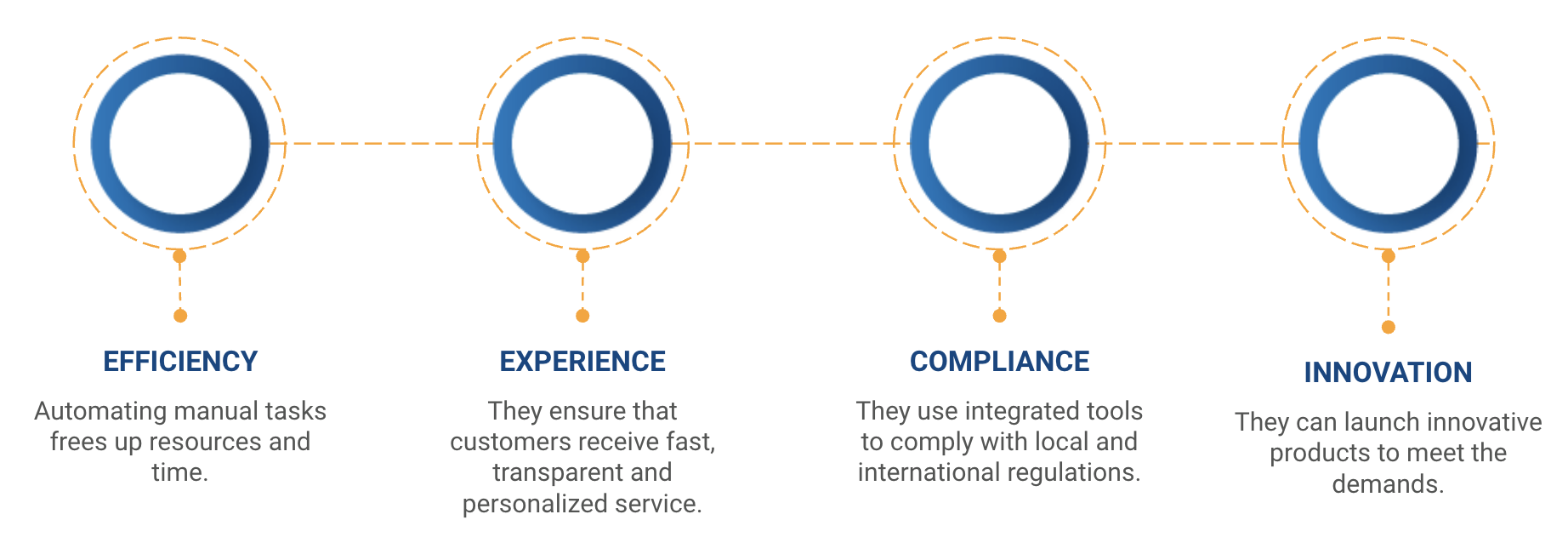Do you know the benefits that the cloud brings to your insurance company? Here we explain.

The insurance industry is undergoing an unprecedented transformation thanks to the advancement of digital technologies. Insurance software solutions are facilitating process optimization, improving customer experience, and allowing insurers to respond quickly to new market trends.
According to a recent study by Deloitte, technologies such as AR/VR, the meta-cloud, and blockchain are making a difference in the way these companies operate and offer value to their customers. In this article, we will discuss how an insurance software agency can help insurers embrace these trends and overcome current challenges.

Software solutions that help insurance companies
Trend 1: Augmented Reality and Virtual Reality for immersive experiences
As immersive technologies such as augmented reality (AR) and virtual reality (VR) become more accessible and affordable, insurers have a unique opportunity to transform their interactions with their customers. Insurance software can integrate these technologies to offer personalized and optimized experiences across various products:
Personal accident insurance: Simulations in virtual environments allow customers to better understand the coverages and benefits of personal accident policies.
Digital products for the immersive world: In the near future, insurers will be able to design specific products for digital assets in the metaverse, such as virtual goods or digital experiences.
Personalized customer service: Through immersive digital channels, insurers can offer “white glove” customer service, interacting with policyholders in their preferred time and place.
Using AR/VR not only improves the customer experience, but also increases operational efficiency by reducing the need for face-to-face interactions. It also helps strengthen customer relationships, increasing retention and loyalty.

Trend 2: Meta-Cloud and the simplification of the multi-cloud environment
Many insurers are adopting multi-cloud strategies to optimize their technology infrastructure, but this transition can introduce complexity in integration, security, and performance. This is where meta-cloud solutions come into play.
Insurance software designed with meta-cloud architecture enables:
Seamless integration: With a level of abstraction that connects cloud platforms, insurers can better centralize and manage their operations.
Built-in security: Incorporating “security by design” ensures that insurers comply with strict regulations while protecting sensitive data.
Agile deployment: With automation through CI/CD pipelines, insurers can deploy new applications or update existing ones quickly and efficiently.
These solutions not only improve the stability and performance of the technology environment, but also allow insurers to choose cloud providers based on specific business outcomes. In short, meta-cloud simplifies the complex, offering flexibility and scalability without compromising security.

Trend 3: Blockchain for trust and automation
Blockchain is moving from being just an experimental technology to becoming a strategic ally for insurers. This advancement allows insurance software companies to design systems that automate key processes in the business data lifecycle.
Process automation: Functions such as policy underwriting, claims adjudication, renewals and payments can be automatically managed through smart contracts on the blockchain.
More efficient reinsurance: Transactions between insurers and reinsurers become more transparent, faster and safer, reducing the risk of errors and fraud.
Trust as a competitive advantage: By adopting decentralized technology, insurers can guarantee their customers that their data is protected and that processes are transparent.
A practical use case would be the implementation of a blockchain system for handling claims, where each interaction is immutably recorded, ensuring the accuracy and integrity of the data.

Key Benefits of Insurance Software Solutions
Implementing a robust and modern system can completely transform an insurer’s operations. Some of the most notable benefits include:
Increased operational efficiency: Automating manual tasks frees up resources and time, allowing teams to focus on activities of greater strategic value.
Improved customer experience: Technologies such as AR/VR, the meta-cloud, and blockchain ensure that customers receive fast, transparent, and personalized service.
Simplified regulatory compliance: Systems designed by an insurance software agency can include built-in tools to comply with local and international regulations.
Continuous innovation: Insurers can launch innovative products to meet changing customer and market demands.

Example of successful implementation
A prominent example of these innovations is the implementation of AR/VR technologies by a leading European insurer. Using software developed by an insurance software company, the company created virtual simulations to explain its policy coverages to customers.
As a result, the insurer experienced a 25% increase in customer satisfaction and a significant reduction in operational costs associated with in-person visits.
Similarly, a North American insurer that adopted blockchain for claims management reduced processing time from weeks to days, improving customer trust and decreasing fraud.
Future of Insurance Software
The future of insurance software is marked by constant innovation and the adoption of disruptive technologies. In this context, working with a specialized insurance software agency is key to staying competitive. From designing customized solutions to implementing the latest technological trends, these agencies offer the tools necessary for insurers to thrive in an ever-changing environment.
In conclusion, the integration of technologies such as AR/VR, meta-cloud, and blockchain is redefining the insurance sector. With the support of expert insurance software companies, insurers can optimize their processes, improve customer experience, and make the most of the opportunities provided by digital transformation. By adopting these innovative solutions, insurers not only ensure their relevance in today's market, but also position themselves to lead the future of the industry.

